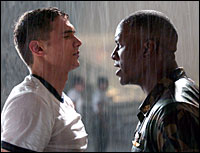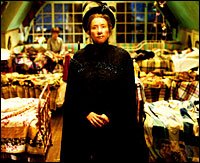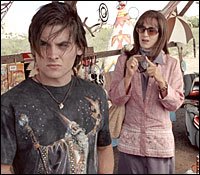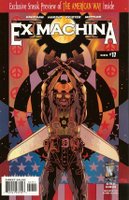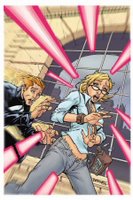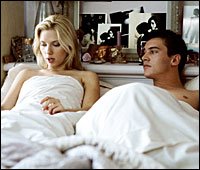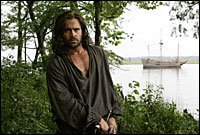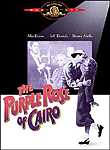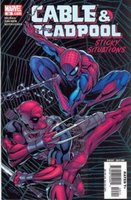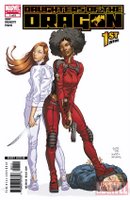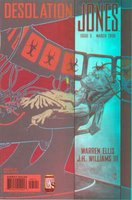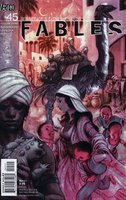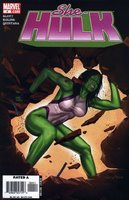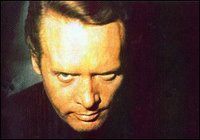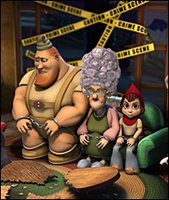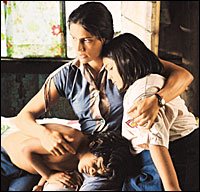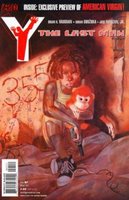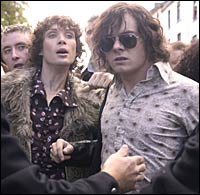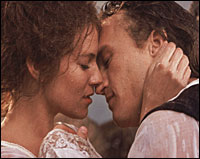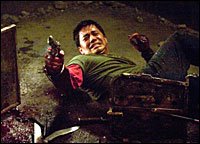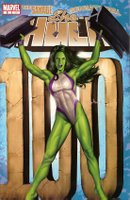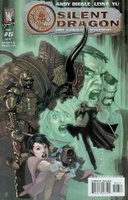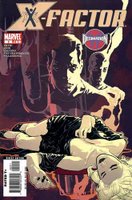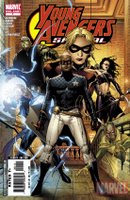 Black Gas #1 (Warren Ellis/Max Fiumara, Avatar)
Black Gas #1 (Warren Ellis/Max Fiumara, Avatar)I gave up on Ellis's Avatar stuff a while ago, after finding Strange Kisses sort of amateurish and gross, but the premise of this series (Ellis's take on zombies) was enough to get me to give it another go, since I generally like his stuff. This is a perfectly okay first issue, pretty much all set-up, and Fiumara's art is decent enough, although it does look a little rough at times. Since this is only three issues, I'll probably stick with it out of curiosity, even though most of Ellis's three-issue minis for larger publishers have ended up sort of trailing off into nowhere. Also, most unfortunate title ever.
 Fallen Angel #2 (Peter David/J.K. Woodward, IDW)
Fallen Angel #2 (Peter David/J.K. Woodward, IDW)I'm still not crazy about Woodward's art, which, like much painted art, looks too stiff, and still for some reason has everyone bathed in celestial light or something. Otherwise, there are some excellent twists and turns in this issue, and David does a good job of explaining what's going on for people who didn't read the first volume or (like me) don't remember every detail from it. I suppose it's too much to hope either for David Lopez to return on art or at least for some more traditional line art, so I'll just live with Woodward's stuff, which isn't that bad anyway.
 Nextwave #1 (Warren Ellis/Stuart Immonen, Marvel)
Nextwave #1 (Warren Ellis/Stuart Immonen, Marvel)Now this is more of the thing I like to see from Ellis. Really, with a few very minor tweaks this could have been a creator-owned book from Wildstorm, but Ellis clearly takes a certain perverse joy in setting it in the Marvel universe. Some people were going nuts about Ellis using these C-level characters in a disrespectful way, but to me he wasn't mocking the characters at all, just letting them cut loose and be fun. This is in many ways a parody of a superhero comic, but it's also got its own internal logic and works on both levels. It was certainly funnier than anything Ellis has written since Transmetropolitan, and, along with Fell, suggests that he's finally found some new ideas to engage him again. On top of that, Immonen's angular artwork with inks by the always excellent Wade von Grawbadger reinvents his style in a really impressive way that complements the story very well. Even the letters page, with its fake letters from historical figures, is amusing, although since I imagine that Ellis wrote it, I was disappointed not to see a letter from Thomas Edison.
 The Pulse #13 (Brian Michael Bendis/Michael Gaydos, Marvel)
The Pulse #13 (Brian Michael Bendis/Michael Gaydos, Marvel)Eh, whatever. I was so excited at the beginning of this storyline that some of the old Alias mojo was back, but by now this issue reads like two completely separate comics - one of which features a storyline (the birth of Jessica and Luke's baby) that belongs in New Avengers and is way too cluttered with guest stars, and the other of which (Ben Urich tracking D-Man) is the kind of thing that I liked about Alias way back when and was hoping Bendis would bring back. The result is to make both stories seem less consequential, and since the D-Man story wraps up quickly this issue, I'm not sure what Bendis has in store for his final issue next time. No matter what, I think this series will go down as a schizophrenic and failed follow-up to the brilliant Alias, and I really doubt that Paul Jenkins can come in and turn it around.
 Revelations #6 (Paul Jenkins/Humberto Ramos, Dark Horse)
Revelations #6 (Paul Jenkins/Humberto Ramos, Dark Horse)Wow, what a disappointing ending. I even almost regret putting this on my top ten of 2005 list, that's how much this issue annoyed me. I really liked how, in the previous issues, Jenkins told a fairly traditional whodunit against the backdrop of the Vatican. There was a murder, and a detective, and clues, and all that, as well as some interesting ruminations on faith. What really appealed to me was that this wasn't some supernatural story about demons and the battle between good and evil; it was a murder mystery in a very high-profile location. There are enough comics about demons and such that one that's just about who killed some dude is refreshing. Well, that's all thrown away in this issue, in which it turns out that Satan was behind it all along. We don't get any sort of satisfactory resolution to the story, and we don't even get to deal with the ramifications of the supernatural revelation either. It's just a terrible ending to a mostly good story that nearly negates all the interesting stuff that's come before it.
 Savage Dragon #122 (Erik Larsen, Image)
Savage Dragon #122 (Erik Larsen, Image)I'm sort of amazed that this actually came out. To give you an idea of how late this is, Larsen is still dealing with the ramifications of his election storyline that was launched to parallel the actual election - in November 2004. Anyway, I was surprised at how easily I was able to follow this issue despite how long it's been since I read the last one. As always, Larsen packs a lot of story into one issue, although given how long the wait has been I sort of felt like not enough happened, and I don't know when I'll get to see the continuation of what does transpire. That aside, it's another rip-roaring superhero tale in Larsen's inimitable style, and he once again engages in some experimenting, this time with a couple of pages that painstakingly recreate the style of cheesy Silver Age superhero comics and add something to the story as well. I'm always pleased to read an issue of this book, and I hope this is a sign that it will return to a more regular schedule.
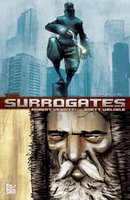 The Surrogates #4 (Robert Venditti/Brett Weldele, Top Shelf)
The Surrogates #4 (Robert Venditti/Brett Weldele, Top Shelf)I've been slacking off in writing much about middle chapters in mini-series, but I wanted to note that this is a particularly good issue of a very good series, which wraps up next month. Venditti has done a very good job of crafting a well-realized future world here, and has come up with a very compelling mystery as well. This issue builds strongly on that mystery and ups the suspense while taking time to explore some of the moral issues brought up by the world the book takes place in. As long as there isn't a big let-down next issue (as with Revelations), this has been an excellent story, and one of the best sci-fi series in recent memory.
Also out this week: Spider-Man/Black Cat #6, which means the series is finally complete, and I'll probably sit down to read the whole thing (and be predictably underwhelmed) some time soon.
